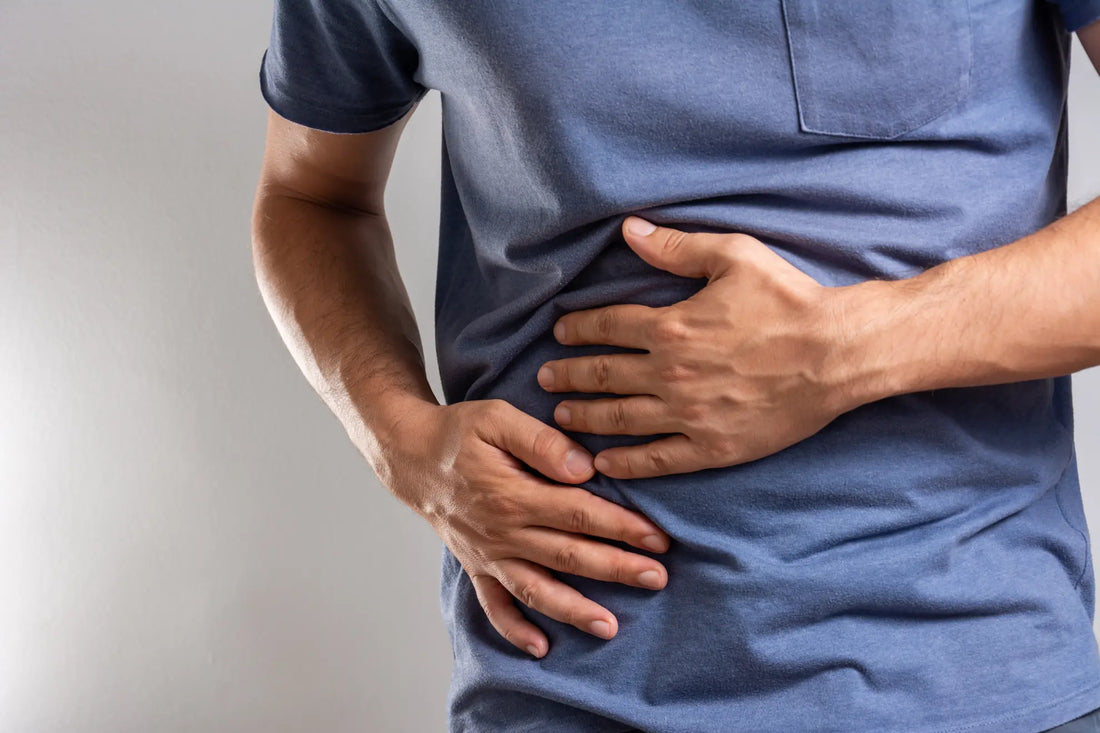Bloating is a common digestive issue that many people experience. It’s often uncomfortable and can significantly affect your day-to-day life. In this blog post, we will explore what bloat is, its common causes, and eight effective ways to prevent it, including how supplements can improve digestion.

What is Bloat?
Bloating is when your stomach feels full and tight, often due to gas buildup in the gastrointestinal (GI) tract. This feeling can be accompanied by swelling or enlargement in the abdomen.
The Digestive Process
Digestion is the process of converting food into smaller pieces that our bloodstream can absorb. This process begins in the mouth, where chewing and saliva start to break down food. It then continues into the stomach and intestines, where a variety of digestive juices and enzymes further decompose the food, making it ready for absorption into the bloodstream.
Role of Digestive Enzymes
Digestive enzymes break down food into nutrients. They target specific types of food:
- Protease: Breaks down proteins.
- Amylase: Breaks down carbohydrates.
- Lipase: Breaks down fats.
- Lactase: Breaks down lactose, beneficial for lactose intolerance.
Enzymes ensure efficient digestion, reducing the likelihood of bloating and discomfort.
7 Ways to Prevent Bloating
- Stay Hydrated: Proper hydration is fundamental to maintaining a healthy digestive system. Drinking enough water throughout the day helps to keep the digestive tract lubricated and facilitates smoother bowel movements. This can prevent constipation, a common cause of bloating. Water also helps to break down food, allowing your body to absorb nutrients effectively.
- Eat Fiber-Rich Foods: A diet high in fiber is essential for preventing bloating. Fiber regulates your digestive system by encouraging regular bowel movements, reducing the likelihood of constipation. Foods rich in fiber, including fruits, vegetables, whole grains, and legumes, also help maintain a healthy gut flora, which is important for digestion and preventing gas buildup.
- Slow Down While Eating: Eating slowly and mindfully can significantly reduce bloating. When eating quickly, you tend to swallow more air, which can lead to gas accumulation in the stomach. Chewing food thoroughly reduces the amount of air swallowed and makes it easier for your digestive system to break down food, thus preventing bloating.
- Avoid Foods That Cause Gas: Certain foods cause gas and bloating in many individuals. These include beans, lentils, carbonated drinks, and cruciferous vegetables like broccoli and cabbage. Identifying and limiting or avoiding these foods can help prevent bloating.
- Manage Stress: Stress has a significant impact on your digestive system. High stress levels can disrupt digestion and lead to bloating. Techniques such as meditation, deep breathing exercises, yoga, or engaging in hobbies can help manage stress levels, thus contributing to a healthier digestive process.
- Try Probiotics: Probiotics are beneficial bacteria, crucial for maintaining gut health. They aid digestion and help balance the gut flora, reducing symptoms of bloating. Probiotic-rich foods like yogurt, kefir, sauerkraut, and kimchi, or probiotic supplements, can be incorporated into your diet to improve digestive health.
- Use Digestive Enzymes: Digestive enzyme supplements are designed to break down food more efficiently. They can be particularly helpful for people who experience bloating due to enzyme deficiencies or have difficulty digesting certain types of food. By enhancing the digestive process, these supplements can reduce the likelihood of bloating and improve overall digestive comfort.
Take Away
Bloating can be a bothersome issue, but you can significantly reduce its occurrence with these eight strategies, including digestive enzyme supplements. By understanding and addressing the root causes of bloating and by assisting your digestion with supplements, you’re taking a proactive step towards better digestive health and overall well-being. Remember, a balanced approach to diet, lifestyle, and digestive aids is key to maintaining a healthy, bloat-free stomach.



